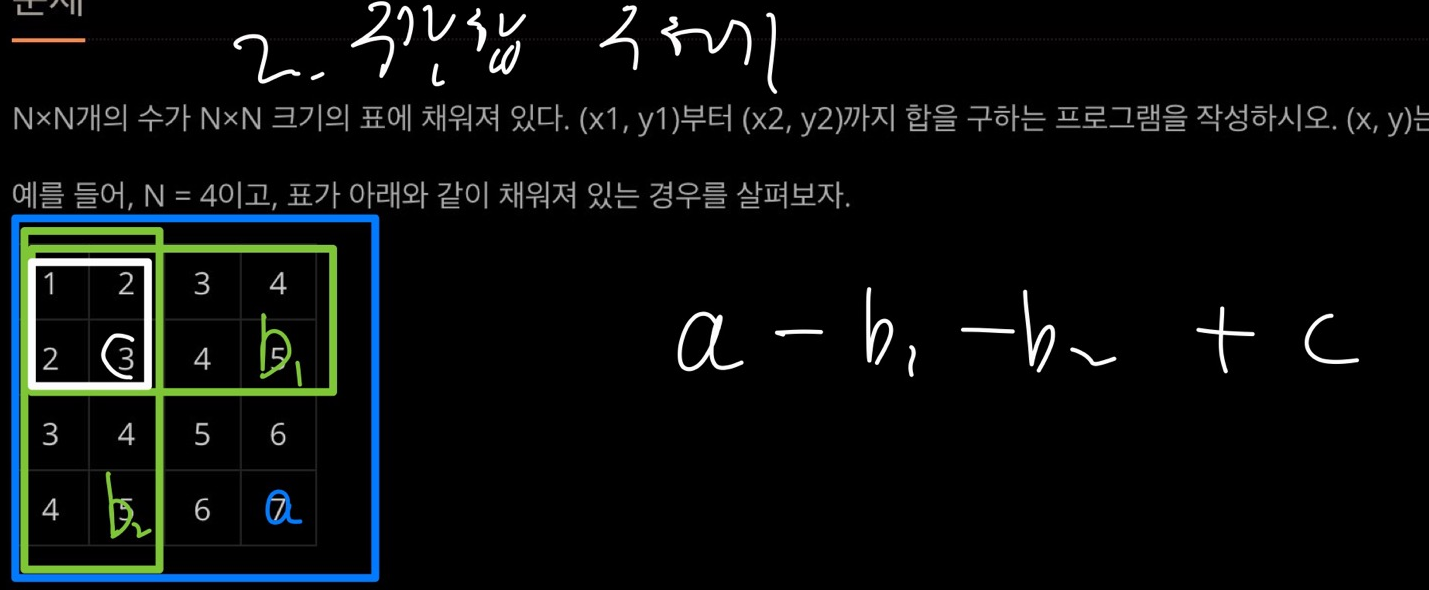맨 처음 풀이 > 시간 초과
# 16:55~
# 바로
import sys
from collections import deque
sys.stdin=open("input.txt", "r")
input=sys.stdin.readline
def Make_sum_board():
for i in range(n):
for j in range(n):
# j=0일 때 예외처리
if i==0 and j==0:
sum_board[i][j]=board[i][j]
elif j==0:
sum_board[i][j]=sum_board[i-1][j]+board[i][j]
else: # 첫번째 라인에서 이거 뭔가 안되는듯.
if i==0:
sum_board[i][j]=sum_board[i][j-1]+board[i][j]
else:
line_sum=sum_board[i-1][j]-sum_board[i-1][j-1]
sum_board[i][j]=sum_board[i][j-1]+board[i][j]+line_sum
def Cumul_sum(x1, y1, x2, y2):
#out of index 오류 방지
ans=0
a=sum_board[x2][y2]
if x1==0:
b1=0
else:
b1=sum_board[x1-1][y2]
if y1==0:
b2=0
else:
b2=sum_board[x2][y1-1]
if b1==0 or b2==0:
c=0
else:
c=sum_board[x1-1][y1-1]
ans=a-b1-b2+c
return ans
def solution():
global ans
# 총합 구하기
Make_sum_board()
# 구간합 구하기
for i in range(m):
arr=arr_range[i]
# 인덱스화 하기 위해 -1
ans_list[i]=Cumul_sum(arr[0]-1, arr[1]-1, arr[2]-1, arr[3]-1)
if __name__=="__main__":
n, m=map(int, input().split())
board=[]
sum_board=[[False]*n for _ in range(n)]
ans_list=[False]*m
for _ in range(n):
board.append(list(map(int, input().split())))
arr_range=[]
for _ in range(m):
arr_range.append(list(map(int, input().split())))
solution()
for x in ans_list:
print(x)시간이 오래 걸린 이유
- Make_sum_board()와 Cumul_sum() 함수 모두 조건 검토, 예외 처리에 너무 많은 시간 낭비를 했다.
이를 해결하기 위해서는 합을 구한 board의 i, j에 대해서도 0이라는 완충지역을 두어서 예외사항을 최소화 해야 한다. - 이걸 쉽게 알아보는 방법은 x=0일 경우, y=0일 경우 예외사항이 너무 많이 나오거나, 이 문제처럼 x1, y1, x2, y2 값을 줄 때 처음 번호를 1로 줄 때 알아차리고 0완충지역을 넣어서 간소화 해야 한다.
모범답안
# 모범 답안
# 아이디어는 비슷한 것 같은데 뭐가 차이나는거지?
import sys
sys.stdin=open("input.txt", "r")
input=sys.stdin.readline
N,M = map(int,input().split())
D = [[0 for _ in range(N+1)]]
## 합 좌표 D 만들기
for i in range(1,N+1): # i, j는 합 넣을 곳(D)의 좌표. D[i][j]
S=0
d=[0]
j=0
for a in list(map(int,input().split())): #바로 읽으면서 이걸 사용해버린다. 어차피 내가 할 프로그래머스는 이렇게 하는 거 아니다.
S+=a;j+=1
# d=[0, 1, 3, 6, 10]
d.append(D[i-1][j]+S)
D.append(d)
# 구간합 구하기
for _ in range(M):
x1,y1,x2,y2=map(int,input().split())
print(D[x2][y2]-D[x1-1][y2]-D[x2][y1-1]+D[x1-1][y1-1])구간합 풀이 설명
 a에서 b1, b2를 빼주고 겹치는 부분인 c를 다시 더해준다. 그러면 2, 2, 4, 4 인 부분의 구간합을 구할 수 있다.
a에서 b1, b2를 빼주고 겹치는 부분인 c를 다시 더해준다. 그러면 2, 2, 4, 4 인 부분의 구간합을 구할 수 있다.
모범답안 보고 고친 내 풀이
# 모범 답안 보고 수정한 내 답안
# 아이디어는 비슷한 것 같은데 뭐가 차이나는거지?
import sys
sys.stdin=open("input.txt", "r")
input=sys.stdin.readline
# 구간합 구하기
def CumulSum(D):
for i in range(m):
x1, y1, x2, y2=scope[i]
print(D[x2][y2]-D[x1-1][y2]-D[x2][y1-1]+D[x1-1][y1-1])
# D만들기
def solution():
D=[[0]*(n+1)] # D에 완충 넣어서 Cumul_sum에서 listOutOfRange error 피할 수 있도록.
for i in range(1, n+1):
d=[0]
s=0 # 해당 행 누적합
for j in range(1, n+1):
s+=board[i-1][j-1]
d.append(D[i-1][j]+s) #바로 위에 값이랑, 해당 board값이랑 더해줌.
D.append(d)
CumulSum(D)
if __name__=="__main__":
n, m=map(int, input().split())
board=[[] for _ in range(n)]
scope=[[] for _ in range(m)]
for i in range(n):
board[i]=list(map(int, input().split()))
for i in range(m):
scope[i]=list(map(int, input().split()))
solution()